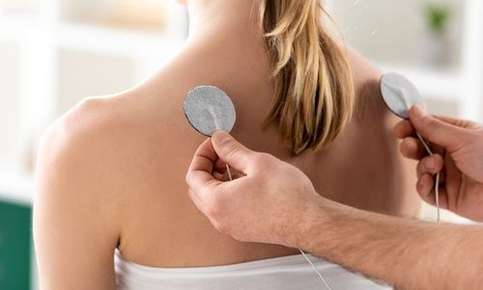
Electrotherapy Offers Natural Pain Relief
Do you struggle to keep your pain under control? Over-the-counter prescription medication relieves symptoms but often causes nausea, dizziness and other side effects that make working, exercising, or taking care of your family difficult. Electrotherapy may offer a better way to manage your pain.
How Does Electrotherapy Work?
Electrotherapy prevents pain signals from reaching your brain by interrupting them with low-voltage electrical impulses. If the signals aren't received by the brain, you don't feel pain. The treatment also triggers the releases of endorphins, your body's natural painkillers.
In addition to providing pain relief, electrotherapy can be used to loosen tight muscles, promote healing, increase muscle tone, reduce swelling, improve range of motion, and strengthen muscles. Although the therapy can be helpful no matter how long you've had pain, it's particularly beneficial if used immediately after an injury.
During treatments, electrical impulses are delivered through adhesive electrodes attached to your skin or a belt worn around your body. Electrodes may be applied directly over the painful area or on a nerve that serves the area.
Electrotherapy treatment isn't usually painful. Many people mention feeling a tingling or pricking sensation when the electrical current is activated. The therapy can reduce pain for as long as 24 hours after a treatment.
Is Electrotherapy Right for Me?
Electrotherapy may be helpful if you have:
- Arthritis
- Muscle or Joint Pain
- Bursitis
- Tendonitis
- Fibromyalgia
- Endometriosis
- Multiple Sclerosis
- Whiplash
- Muscle Spasms
- Sprains and Strains
- Migraines
- Incontinence
- Pain After Surgery
- Muscle Atrophy
- Menstrual Pain
- Shingles
- Phantom Limb Pain
- Cluster or Tension Headaches
- Back or Neck Pain
- Trigeminal Neuralgia
- Sciatica
- Sports Injuries
Electrotherapy can relieve your pain completely or help you reduce your reliance on painkillers. In a study published in the Western Journal of Emergency Medicine, 100 percent of emergency patients who received the treatment found it helpful in reducing pain when combined with other treatments.
The therapy may not be a good option if you're pregnant, have a heart condition, epilepsy, a pacemaker, defibrillator, infusion pump, or metal implant.
What Types of Electrotherapy Treatments Are Available?
Electrotherapy may be part of your chiropractic treatment plan, in addition to spinal manipulation, massage, soft tissue mobilization, or ultrasound therapy. Your chiropractor might recommend one or more of these types of electrotherapy:
- Transcutaneous Electrical Nerve Stimulation (TENS). TENS treatment uses both high and low-frequency electrical pulses to decrease chronic or sudden pain. A dial controls the intensity of the pulses. Portable home TENS units are fairly small and can be worn during your usual daily activities.
- Inferential Current (IFC). IFC treatment may be the next step if your pain doesn't respond to TENS therapy. The IFC device produces currents that penetrate the muscles and deeper layers of the skin.
- Galvanic Stimulation (GS). The galvanic stimulator generates short bursts of pulsed electrical currents. Depending on the setting, the machine can be used to reduce swelling or improve blood flow. Increasing blood flow to an injured area offers a simple way to speed healing time while reducing swelling and can improve the range of motion of an injured or painful area.
Pain doesn't have to control your life. Electrotherapy and chiropractic treatments can help ease your pain and improve your mobility. Contact us to schedule your appointment.
Sources:
SPINE-health: All About Electrotherapy and Pain Relief, 4/21/17
Medical News Today: What Is a TENS Unit and Does It Work?
